Polish elections will be held this Sunday, October 15, 2023. Many things can happen in these elections and the results are far from the easily predictable. Polls are diverse and give very disparate results, making the outcome near impossible to predict with clarity and certainty.
The Polish elections are marked by the Russo-Ukrainian war, the economy and religion and the results of these elections may affect the European Union, noting, the Polish relationship with the European Commission and the European Parliament in recent years has not been the best. A victory of Donald Tusk could turn the tables and return to mainstream Europeanism, leaving Hungary, Poland’s natural ally in Europe, alone. However, another victory by the Law and Justice party could earmark the European trend of the “new conservative right”.
Proposed Policies: PiS Goes Nuclear, PO does something else
The Law and Justice party (PiS from now on), is the party that in the two previous elections (2015 and 2019) has obtained the absolute majority in the Polish parliament. However, the absolute majority is in danger in these elections.
Law and Justice Comes Through Military Procurements, Nuclear Power and Immigration Reform
PiS is the conservative party par excellence. It is a pro-sovereignty, Christian, specifically Catholic, pro-life party, in favor of social capitalism. PiS supports families with pro-family policies and it is against illegal immigration. These are the main pillars of PiS, that are most talked about in the campaign and that have the most impact in Poland and abroad. The last thing we can add to these pillars is unconditional support for Ukraine. The Russo-Ukrainian war has become one of the big issues in Poland, but not only in Poland, as it could be seen 2 weeks ago in the Slovak elections or as it can be seen in the debates in the US primaries.
On energy, they seek a rapid energy transition, building an energy mix based on nuclear power, supported by renewable energy sources. PiS announces the construction of two nuclear power plants in the framework of the government program, in fact, their plan is to aim to build a total of six nuclear plants. By 2033 they want to have the first plant fully operational and by 2040 they want nuclear energy to account for 20 percent of the energy produced in the country. However, Poland is not forgetting about coal, which currently accounts for 75 percent, and they have said: “until investments in nuclear power are made, coal is and will remain the guarantee of Polish energy security. Therefore, we will maintain extraction in domestic mining facilities to ensure an adequate amount of raw material for the energy sector,” they say in their election program.
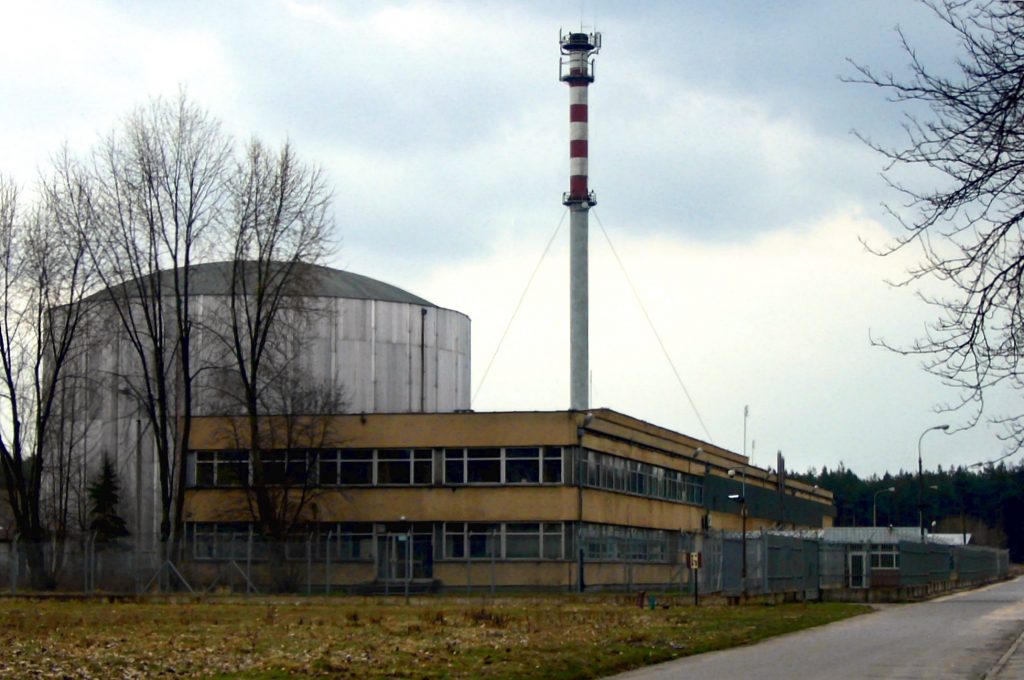
Site of “Maria”, Poland’s second nuclear energy research reactor at Świerk-Otwock, near Warsaw and named in honor of Maria Skłodowska-Curie. It is the only reactor of Polish design. (Photo: Wikimedia Commons / Bartosz Marcin Kojak)
In the area of pensions, which is a hot topic in European countries, they propose the introduction of voluntary pensions based on length of service: for women after 38 years of service and for men after 43 years.
In pro-family and pro-small towns and villages measures, an employer who hires a young person will be able to receive a subsidy to create a job remotely. “This will promote the employment and activation of young people, including those in smaller cities and towns.” Likewise, this subsidy will also be given if a person under 45 years of age is hired if he or she has a dependent child or a person under 30 years of age if he or she is taking care of a person. Likewise, another of its star stocking is the 500 plus, which would be instead of 500 zlotys (109.17 euros) for each child per month, would go to 800 zlotys (174.67 euros).
In military matters, PiS states that it will continue with the modernization of the Polish army, i.e. the programs already launched for the purchase of modern weaponry procured from South Korea (K2 tanks, K9 howitzers or FA-50 training aircraft), the United States (Patriot system, F-35, Abrams tanks) or the United Kingdom (Narew program, Miecznik frigates). Law and Justice also intends to increase the size of the army to 300 000 soldiers.
In addition, the Law and Justice party plans changes in defense-related education: new military high schools will be launched, new uniform classes will be created in high schools and 1 000 of them will be established throughout Poland.
In the area of broader security policy, the Law and Justice party announced changes in the immigration policy, as well as the regulation of visa issuance procedure. It is stressed that one of the objectives is to fight against dishonest entrepreneurs who want to bring in more workers than they need. The blocking of the bonding system (a mechanism that would impose a specific fee on employers for each declaration of their intention to entrust a job to a foreigner) will be instrumental to fight against the illegal practice of numerous applications for work permits issued for workers from foreign countries and not covered by the real needs of employers. The visa deposit mechanism will allow a more informed and sustainable recruitment of foreign workers by national operators.
The Civic Way: More EU, More Libaralism
The Civic Platform (PO from now on) is the other major party, which prior to PiS had governed 8 years in a row with Donald Tusk as Prime Minister. PO is characterized as a center and progressive party. Unlike PiS, PO supports sexual liberation, being in favor of abortion, in vitro fertilization and even civil unions for same-sex couples. Also, they believe in the European Union as it is currently set up, unlike PiS’s certain skepticism. Also, economically they are more liberal than PiS, moving from that social capitalism to a more competitive capitalism, promoting tax cuts and privatization of strategic sectors. And contrary to PiS, they define themselves as a secular party and seek secularism for the Polish State.
In economic matters, one of the main proposals will be to double the tax-exempt amount to 60 000 zlotys (13 098.44 euros). Workers who, for example, earn 6,000 zlotys (1 309.84 euros), will not have to pay any taxes. Likewise, they have also promised that teachers will have a base salary increase of 30 percent, i.e. 1 500 zlotys (327.46 euros). Also, people with disabilities will be able to work without losing their disability pension.
In energy matters, the PO has been in favor of renewable energy sources. In their electoral program, they speak of restoring favorable billing rules for energy produced energy for prosumers: lower electricity bills for investing in photovoltaic energy. They will also present a bill to unblock the possibility of developing onshore wind energy. Finally, they are also in favor of nuclear energy, although not as clearly and forcefully as PiS does.
In religious matters, PO considers itself a secular party and they want Poland to be a secular state. In their program, they speak of abolishing the Ecclesiastical Fund and they will abolish religious notes from school certificates. Finally, they speak of suppressing the economic activities of parishes, convents and other economic activities of churches and religious associations such as churches and religious associations, with the exception of activities for humanitarian, charitable and philanthropic, humanitarian, charitable, welfare, scientific and educational purposes.
On security, the PO proposes EU funding for the defense of the border with Belarus, wanting to eliminate the route of smugglers passing from the Middle East to Poland through Belarus and beyond into the EU. They will also prohibit the use of the military for partisan and electoral purposes.
Issues Defining the Polish Elections
One of the main issues in these elections campaign has been the Russo-Ukrainian war and the military and economic support to Ukraine, as well as the question of the almost three million Ukrainian refugees currently living in Poland. Due to the policies of governing PiS, Poland has been Ukraine’s main ally since the war began, one of the countries that has given the most aid to Ukraine, not only economically, but also militarily. It is also the country that has put the most pressure on its Western allies to get more involved in the war, demanding more military and economic aid, as well as asking for even more sanctions against Russia. However, in recent months, the relationship has deteriorated somewhat with the Polish ban on Ukrainian agricultural imports. Following this, Ukraine said it would denounce the countries that had lifted bans, including Poland, Hungary and Slovakia. This led to tensions. Ukrainian President Volodymyr Zelensky suggested that Poland became an ally of the Kremlin because of all this. Polish President Andrzej Duda compared Ukraine to a person who is drowning, making the comparison that the danger of helping someone who is drowning has the risk they will end up drowning you. Polish Prime Minister Mateusz Morawiecki also stated that they would not send any more weapons to Ukraine. Also, PiS knows that farmers are a big voting sector for the elections and that many nationalists with these latest statements and actions could end up voting for them.
Another contender in the elections, the Konfederacja party alliance stated that PiS was being submissive to the United States and they promised that if they came to power, they would take away all aid to Ukrainians residing in Poland and that there would be no more funding to Ukraine. The opposition supports refugees and Ukrainian funding, in fact, Daniel Tusk and various anti-PiS media said PiS was pro-Russian for having alliances with Orban or Marine Le Pen. For that very reason, Hungarian-Polish relations became estranged.
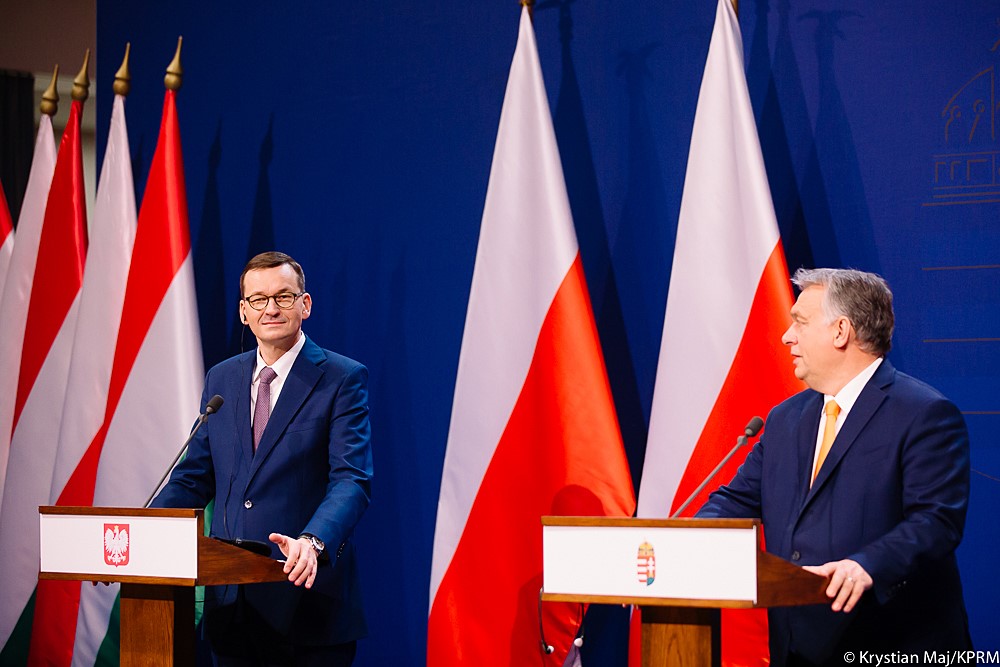
Mateusz Morawiecki with Hungarian Prime Minister Viktor Orban in Budapest, Hungary in November 2020 (Photo by Krystian Maj / KPRM / Wikimedia Commons)
Consequently, another major issue is security, namely the militarization of Poland, buying high-tech military from South Korea, the United States and the United Kingdom. PiS already warned that it would increase the army from 150 000 soldiers to 300 000 soldiers. Poland has had bad experiences with Russia and they know perfectly well what they are like, that is why they were among the first to warn about Ukraine. Likewise, the problem that occurred in 2021 withthe so-called hybrid war between Poland and Belarus due to the case of the wave of illegal immigrants on the Polish-Belarusian border led to the construction of a border barrier, which in recent weeks has again been in the news due to a new wave of immigrants trying to access Polish territory. Likewise, the images seen in the riots in France have helped Polish Prime Minister Morawiecki, to tell Poles in his message that “this is what would happen if there are open borders and mass immigration is welcomed.”
The European Union has also been one of the big issues. Poland has had its post-pandemic reconstruction aid funds frozen due to violations by the Polish state of the rule of law, according to the European Commission.
Along with Hungary, Poland is the only country to have part of this aid frozen. Poland, at the beginning of the war, tried the strategy of dissociating itself from Hungary, because of its more neutral position in the war, and with its more pro-Ukrainian role and being one of the main leaders in the struggle to get as much as possible to Ukraine, partly to see if it could help it to get the funds. However, despite European Commission President Ursula von der Leyen saying she would look into the issue, the European Parliament (thanks to the work of the European People’s Party and the Renew groups) refused to do so, bringing Poland back into a better relationship with Hungary. Also, with the new migration pact that the EU wants to implement, PiS has been very critical and they have said that they will not accept it and will hold a referendum so that the Polish citizenry can speak, as Hungary already did in 2016.
Donald Tusk has been very critical of the PiS government. The PO leader has claimed that PiS was destroying the rule of law and was turning Polish democracy into an autocracy. Konfederacja has been critical of the European Union, saying that they have meddled too much in Polish affairs and that it is not the role of the EU to meddle in the sovereignty of member countries.
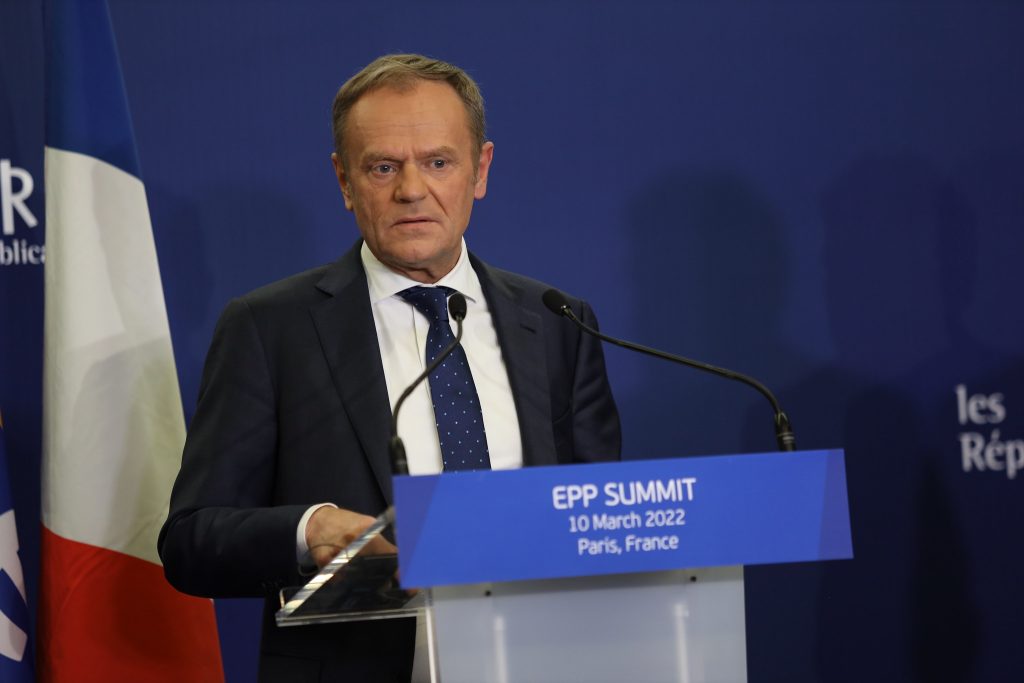
Polish politician Donald Tusk at the 2022 summit of the European People’s Party (Photo: EPP / Flickr.com)
Finally, another big topic is the economy. Since the European Central Bank (ECB) “printed a lot of money” party due to the war in Ukraine, it caused most countries to have high inflation and energy costs to rise, causing most currencies to devalue. Poland, not being part of the eurozone had a double inflation, the inflation of the euro itself and the inflation of its currency against the euro. Despite some economic policies pursued by the Polish government, Poland is one of the countries in the European Union with the highest inflation, currently with an inflation rate of 8.2 percent, which went up to 14.8 percent last year. In fact, it was the second most worrying issue for Poles, according to the survey published by Wydarezenia. Obviously, the opposition has attacked the government’s management, blaming inflation largely on the Polish government.
Surveys and Analysis of Potential Results of the Polish Elections
To make a small point, since this can lead to confusion, in many of the polls instead of seeing PiS and PO, you can see ZP and KO. This is because the majoritarian parties go in coalition with small parties.
In the case of PiS, in its coalition (ZP) go: Sovereign Poland, The Republicans, Renewal of the Republic of Poland, Stronnictwo Piast and some independents. They also have external support from: Kukiz’15, Polish Affairs, and Federation for the Republic.
In the case of PO, in their coalition (KO) go: Modern, Polish Initiative, The Greens, Good Movement, AGROunia and some independents. They also have external support from: Yes! For Poland, League of Polish Families and Democratic Left Association.
Almost all polls, in fact, all the latest ones from October do not give the possibility of winning alone to any party, nor to the PiS coalition.
There are many scenarios that give the possibility of a PiS and Konfederacja government.
The pollster Estymator published a survey on October 6, giving 36.9 percent to the ZP coalition, 30.5 percent to the Ko coalition, 9.3 percent to Konfederacja, 9.3 percent to Lewica and 9.4 percent to the center TD coalition PL2050/PSL. ZP would have 202 seats, KO 153, TD PL2050/PSL 37, Konfederacja 36 and Lewica 31. Absolute majority is at 231 seats, far from ZP’s absolute majority.
Poland, Estymator poll:
ZP-ECR: 37%
KO-EPP|RE|G/EFA: 31%
TD PL2050/PSL-RE|EPP: 9% (-1)
Kon~NI: 9% (-1)
Lewica-S&D: 9%
BS-* 3% (-1)+/- vs. 29-30 September 2023
Fieldwork: 5-6 October 2023
Sample size: 1,060➤ https://t.co/TMumh6CCxH pic.twitter.com/zRxFHafqkd
— Europe Elects (@EuropeElects) October 9, 2023
Konfederacja may be the natural partner of PiS, but there are some areas where they are very different. Where they are most similar is in social conservatism, both parties are in favor of pro-life laws, of a Catholic Poland, against gender ideology, against gay marriage. On energy, they also agree, they believe that nuclear energy is the best for the country.
However, economically they are totally different, while PiS has a more social democratic economic vision, what they call social capitalism, that is to say, a capitalist economy, but in which wealth is distributed and social policies are applied, Konfederacja however seeks to lower almost all taxes, eliminate subsidies, reduce public administration and try to eliminate bureaucratic processes that they find unnecessary. They also want the state to interfere as little as possible in the economy and for the market to be as free as possible.
Another thing they disagree on is foreign policy, PiS finds the United States to be the main ally and American allies, consequently, are Poland’s natural allies. Konfederacja is only open to cooperate with the United States when Donald Trump, or someone similar to him, returns to the White House, they do not want to negotiate anything with the Democratic Party.
Likewise, they declare themselves to be anti-Zionist and look for other types of allies that need not be the same as those of the United States. On the Russo-Ukrainian war they also disagree, while PiS seeks to finance Ukraine as much as possible and to add as many sanctions as possible to Russia. However, Konfederacja says they want to end all funding to Ukraine, including eliminating all Polish aid to Ukrainian citizens in Poland.
We can observe that despite having a shared vision of morality, society and spirituality, in other types of issues they are totally different. However, many analysts believe that these will be more important than the economic sector and the financing of the war.
Another big scenario would be an opposition government, in which PiS would not be able to govern.
Despite the fact that there are fewer surveys of this type, in the last few weeks this possibility has been seen, provided, however, that the Third Way centrists choose the KO coalition and not the ZP, although there are many analysts who see a union of ZP, Third Way and Konfederacja as unlikely.
The poll released by United Surveys gives this possibility. ZP would get 32.3 percent, Ko would get 26.4 percent, the center TD coalition PL2050/PSL would get 12.1 percent, Konfederacja would get 9 percent and Lewica would get 8.1 percent. ZP would have 186 seats, KO 148, TD PL2050/PSL 57, Konfederacja 37 and Lewica 31. As we have stated above, the absolute majority is at 231 seats, far from ZP’s absolute majority. ZP and Konfederacja do not reach either, as they total 223 seats, falling 9 seats short of the absolute majority. However, KO, TD PL2050/PSL and Lewica would reach 236 seats.
The reason that could lead these three parties to form a government is one: to kick PiS out of the government.
The three parties have been very critical of the management carried out by the conservative party, for this reason, one of the great assets of KO is to look for partners to kick PiS out of the government. Another similarity between the three parties is morality, the three parties (with the exception of PSL, which is in the centrist coalition of Third Way) seek the secularism of the Polish State, in addition, the three parties are more open to more progressive social aspects, such as the extension and legalization of voluntary abortion, the union between two persons of the same sex and other progressive policies. In energy matters, most of them agree to look for renewable energy sources and to get rid of coal as a primary energy source, as dictated by the European Union. In economic matters where they could clash a little more, KO and Third Way do agree on a liberalization of the economy and certain privatizations, although not many. However, Lewica is a party more open to social policies and redistribution of wealth, where interventionist policies in the economy would be its economic key.
As in the other case, many experts believe that here the social and moral key could be the trigger for the union of the three parties to form a government, in addition to the key I said above, to kick PiS out of the government.
Bonus Round: The Referendum on Migration
On the same day of the elections a referendum will also be held, the referendum mentioned concerning the European Union’s the new migration pact, which would make the States accept a new rate of refugees and that if they do not end up accepting them they will be obliged to pay 22 000 euros for each refugee that is not accepted.
The current Polish government has repeatedly said that it will not accept the new pact, as it is a violation of the sovereignty of member countries to decide how they want to conduct their migration policy.
This referendum will take place on the same day as the elections in order to have more participation, since if it were held on another day, surely fewer people would go to vote and it would have less legitimacy. This same system was used by the Hungarian government in its last elections, where a referendum was held on the law on the protection of minors, which the European Union wanted to sanction Hungary for accepting the law seen to be anti-LGBT. Hungary said that it was a violation of the sovereignty of a member state and that they themselves were bypassing the treaties, as it was an educational law and the European Union has no competence in education.


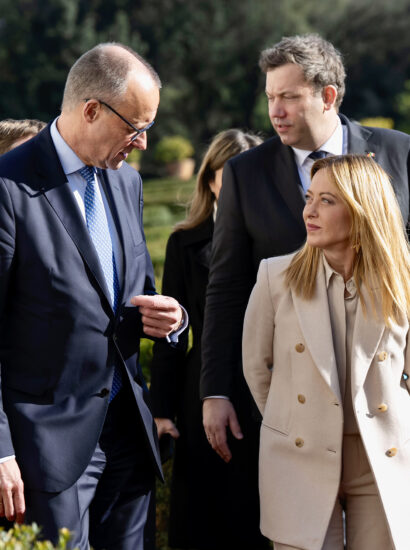

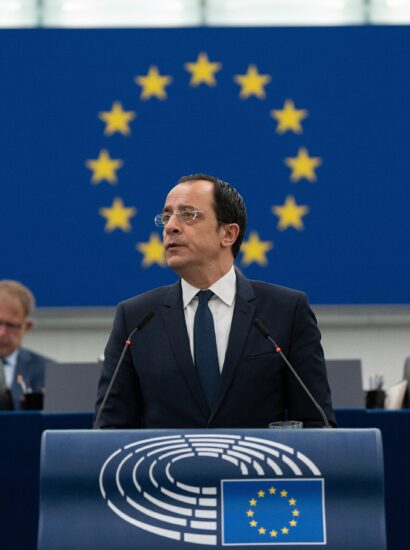



[…] On October 15, 2023, elections were held in Poland to elect members of Parliament (Sejm) and the Senate. These elections seemed to be the closest for the ruling Law and Justice Party (PiS) in a long time, but the result was even worse than expected, as we wrote in our forecast. […]